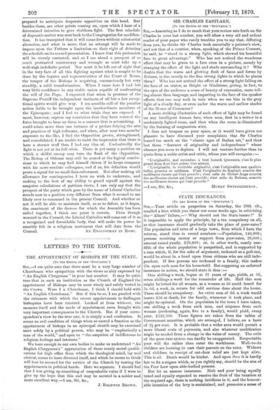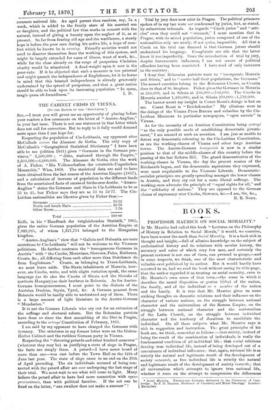STATE INSURANCES.
[TO THE EDITOR OF THE " SPECTATOR.1
SIR,—Your article on pauperism on Saturday, the 29th ult., recalled a hint which you threw out some weeks ago, in criticizing the " Albert" failure,—" Why should not the State insure ?" Is it impossible to apply the principle, by a tax compulsory on all, so that insurance should gradually take the place of poor-rates? The population and rates of a large town, from which I have the returns, stand thus in round numbers :—Population, 140,000 ; persons receiving money or support from poor-rates, 29,000 ; amount raised yearly, 129,800 ; or, in other words, nearly one- fifth of the whole population is pauperized, and is supported by a sum which, if, for the sake of argument, reckoned as a poll-tax, would be about 5s. a head upon those citizens who are still inde- pendent. If five persons are reckoned to a family, this makes 25s. upon each man for his household. But supposing an enforced insurance in action, we should state it thus :-
One shilling a week, begun at 21 years of age, yields, at 56, seven shillings a week for the remainder of life. Half this sum might be levied for all women, as a woman at 56 could board for 3s. 6d. a week, in return for odd services done about the house. These should be compulsory. An extra sum of 6d. a week would insure £56 at death, for the family, whenever it took place, and might be optional. On the population in the town I have taken, one shilling a week from each man, and sixpence from each woman (reckoning, again, five to a family), would yield, every year, £122,500. These figures are taken from the tables of Government annuities, which are arranged, I believe, on a basis of 21 per cent. It is probable that a wider area would permit a more liberal scale of payments, and also whatever modification might be needed from a change in the value of money. The evils of the poor-rate system can hardly be exaggerated. Respectable poor will die rather than enter the workhouse. Well-to-do children are learning to cast their parents on the rates. Widows and children in receipt of out-door relief are just kept alive. This is all. Death would be kinder. And upon them it is hardly fair to fix a stigma which, as you rightly say, should be the aim of the Poor Law upon able-bodied persons.
But let us assume insurance. Rich and poor being equally taxed and equally expected to receive the fruit of the taxation at the required age, there is nothing invidious in it, and the honour- able intention of the levy is maintained, and promotes a sense of
common national life. An aged parent then receives, say, 7s. a week, which is added to the family store of his married son or daughter, and the political law thus works in concert with the natural, instead of giving a bounty upon the neglect of it, as at present. So far from fearing old age and the workhouse, a steady hope is before the poor man during his active life, a hope of com- fort which he knows he is earning. Friendly societies would not need to dissever themselves from the working of this system, and might be largely extended for cases of illness, want of work, &c., while for the class already on the verge of pauperism Christian charity would be stimulated. A dead-weight upon it now is the poor-rate. If it be objected that such a measure is too paternal and might quench the independence of Englishmen, let it be borne in mind that this boasted independence is already grievously undermined by the spread of pauperism, and that a great nation should be able to look upon its increasing population " In spew,



































 Previous page
Previous page